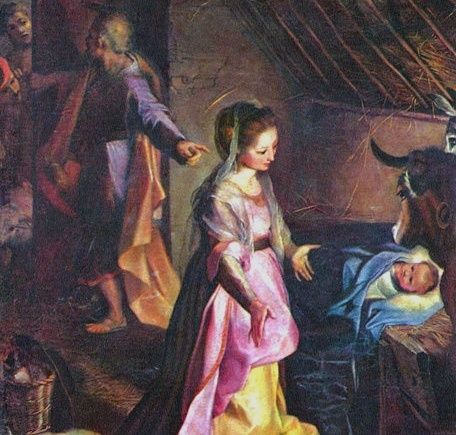“And behold, the star that they had seen when it rose went before them until it came to rest over the place where the child was.” Matthew 2:9
 Since Lars is talking Christmas, let me throw out this holiday thought. The star which brought the Magi to Bethlehem to find the newborn king (cf. Matthew 2:1-12) was either a supernatural event or a natural one. If we say it must be an angel or a divine light shone only for the birth of Christ Jesus, then we have nothing more to say. An astronomer who has written a book on the Bethlehem Star notes this view has had credibility from good men over the years. “The great astronomer/astrologer Johannes Kepler,” Mike Molnar writes, “thought the Star was a miracle accompanied by natural phenomena such as a triple conjunction and a supernova similar to what he observed in 1604.”
Since Lars is talking Christmas, let me throw out this holiday thought. The star which brought the Magi to Bethlehem to find the newborn king (cf. Matthew 2:1-12) was either a supernatural event or a natural one. If we say it must be an angel or a divine light shone only for the birth of Christ Jesus, then we have nothing more to say. An astronomer who has written a book on the Bethlehem Star notes this view has had credibility from good men over the years. “The great astronomer/astrologer Johannes Kepler,” Mike Molnar writes, “thought the Star was a miracle accompanied by natural phenomena such as a triple conjunction and a supernova similar to what he observed in 1604.”
But if we hope to find a natural explanation, there are many options and a great deal of research to do. I heard an expert on the radio say that new explanations for the Star of Bethlehem are offered almost every year, and Molnar has a whole book on his explanation of a natural occurrence. He gives a good bit away in the FAQs on his site.
Not long ago I told my girls that the star had to be supernatural because the Bible says it moved before the Magi and stopped over Jesus’ location. Now I am second-guessing. My only thought for this post, small and nearly pointless it may be, is that we know the Lord uses even foolish reasoning for his purposes, so it is entirely possible for the Magi, being astrologers, to interpret the Star’s normal behavior in the sky as guiding them in ways we would believe to be crazy if we could have them explained today. These wise men saw Jupiter approaching a part of the sky, and they interpreted as it to mean a king will be born in Judea. Apparently the astrology all works out for regions to have symbols and planets to have meanings. In this way, the Magi believed they had seen heavenly signs of a Judean king, so they went to Jerusalem to ask about him. Herod’s scribes told them Micah’s prophecy, and they went to Bethlehem.
The Magi may have believed the Star was directing them (moving and stopping) in ways we would not agree had we been there to argue about it, and isn’t that the way God works sometimes. He blesses good-hearted people who run with out-of-context verses. He helps those who have bad theology–not often, but often enough to notice. That’s no excuse of laziness in worship or Bible study, but it is a good reason to praise him for his grace and mercy.


